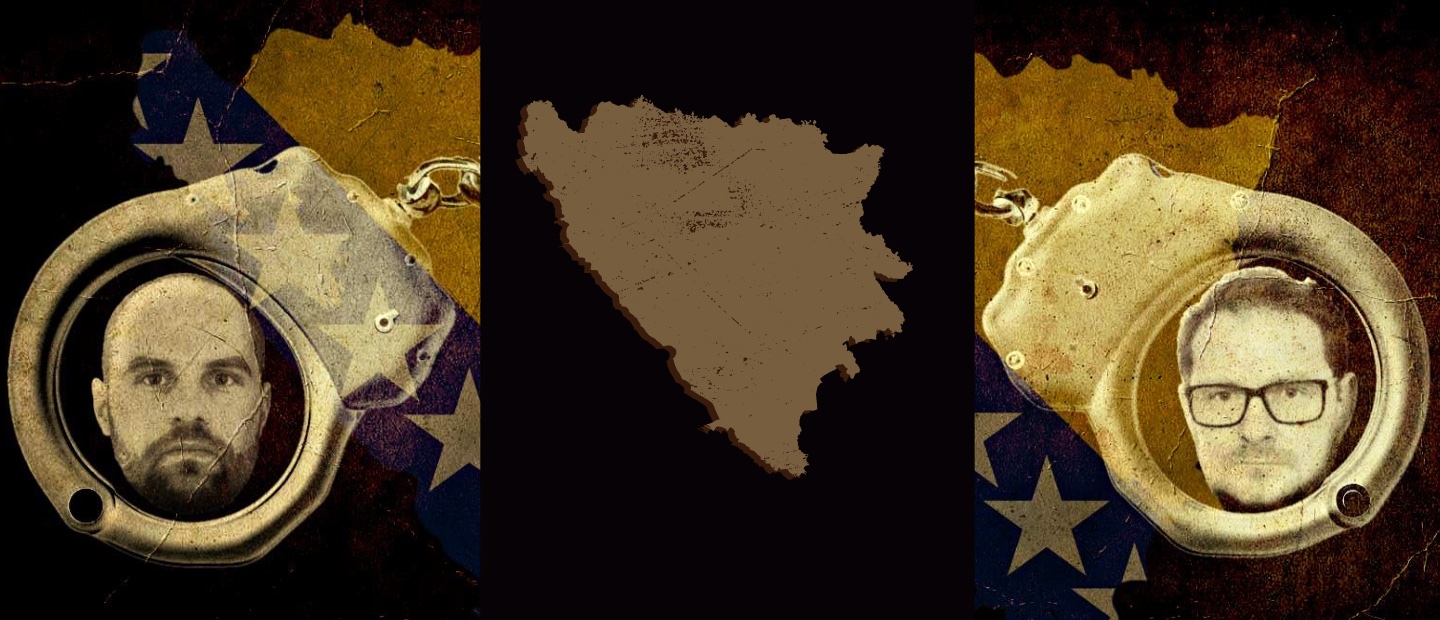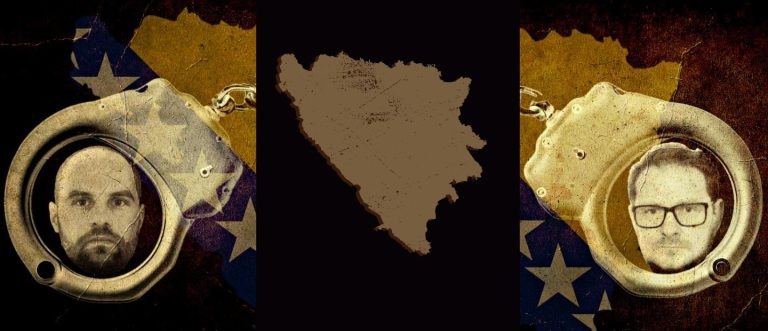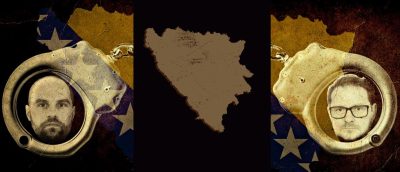Illustration: Free Vector Maps, Polícia SR (ICJK) 2023-12-13
Illustration: Free Vector Maps, Polícia SR (ICJK) 2023-12-13
A new ICJK and BIRN investigation reveals how two foot-soldiers in an internal war going on within the Slovak police are living in exile in Bosnia, why they haven’t been extradited back to Slovakia, and why their situation at home might be about to improve.
If we accept the description of the power struggle that’s currently going on within Slovak law enforcement as a “war within the police”, then Marian Kucerka and Jan Kalavsky can be considered foot soldiers on the front lines of the conflict.
These two high-ranking officers of the Slovak National Crime Agency (Narodna kriminalna agentura, or NAKA) played a key role in the war’s beginnings after getting caught up in corruption scandals and starting an internal battle in an attempt to extricate themselves. They then fled to Bosnia and Herzegovina, beyond the borders of Slovakia and the EU, to escape the consequences.
The Jan Kuciak Investigative Centre (ICJK), together with BIRN, decided to search for the two former Slovak police investigators to find out how they were living and why the Balkan country has not yet extradited them. The journalists caught up with Kucerka outside a court in Sarajevo, while Kalavsky was doorstepped in front of his new house in the town of Trebinje in Bosnia’s Republika Srpska.
The article was originally published on balkaninsight.com. A longer Slovak version was published on icjk.sk
All indications are that life in the Balkan country is not proving much of a punishment for the two exiles. And thanks to the lengthy asylum process, they won’t be returning to Slovakia anytime soon.
Even so, with the September election of populist Robert Fico to another term as Slovak prime minister, a proposed amendment to the Criminal Code by the three-party coalition that he heads could make the situation back home much more conducive to returning.
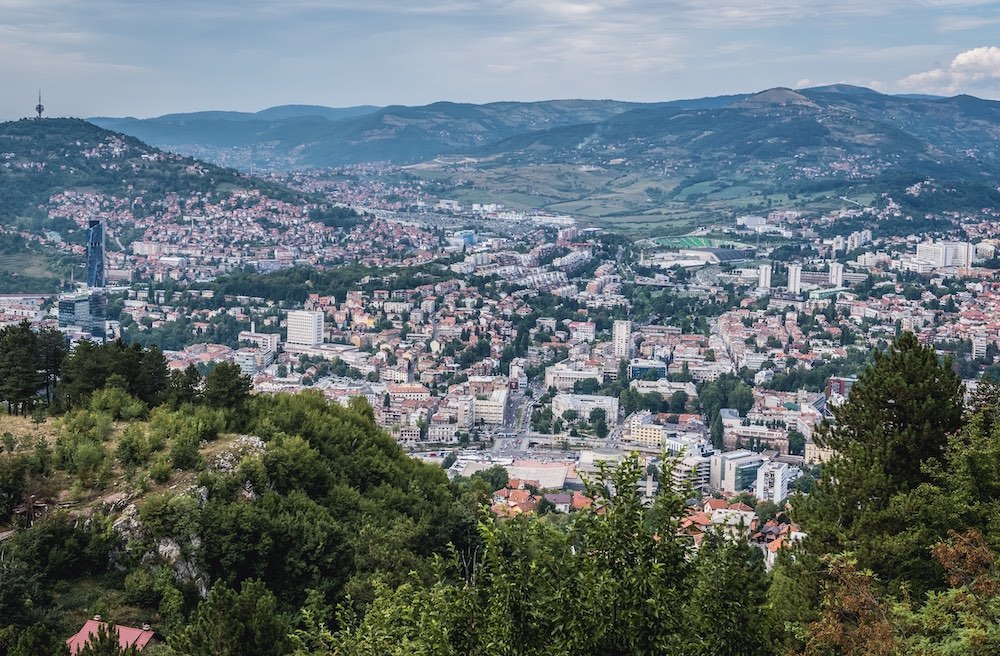
Aerial view from mount Trebevic on Sarajevo, Bosnia and Herzegovina. Photo: Fotokon / Shuttertock
Flight to Bosnia
Jan Kalavsky and Marian Kucerka came to the public’s attention mainly thanks to recordings that Robert Fico played at press conferences while he was still an opposition politician,
These were since shown to have been manipulated, edited or just purposely rewritten in such a way as to harm a team of investigators around Jan Curilla, a well-known investigator of major cases at NAKA, which was looking into serious corruption and other crimes during the period of previous Smer governments.
Kalavsky and Kucerka, the men behind those doctored secret recordings, are both former high-ranking officers of NAKA who became caught up in corruption and abuse-of-position cases.
Kalavsky was sentenced to seven years in prison by the first instance court and is awaiting a decision from the appeals court. In the case of Kucerka, he has already been convicted and handed a prison sentence of 10 and a half years for corruption.
It was these two investigators who were key players in the beginnings of the war within the Slovak police force that is still going on today.
Kalavsky’s troubles began in May 2021, when the Office of Inspection – an internal affairs unit within the Ministry of Interior – accused him of leaking information. He was in charge of operatives at NAKA, so was in possession of high-level information concerning upcoming police actions, such as arrests and raids. According to the indictment and the verdict of the court of first instance, he traded that information with people with links to the criminal underworld.
After his indictment, Kalavsky became a police inspection informant and turned on his colleagues in the team around Curilla, whose conduct had fallen under suspicion by internal affairs. His indictment was dropped weeks later by the General Prosecutor’s Office, yet the office has still not dismissed the charges against the NAKA investigators to date, which are based on what experts say were the manipulated recordings made by Kalavsky.
In September 2021, Kalavsky was accused again, this time by his former colleagues from NAKA, who, according to the recordings, were his friends up until the last moment and did not want to believe that he had acted illegally. However, Kalavsky did not wait for the outcome of the trial. In September 2021, he fled to Bosnia, where he still resides today.
Slovakia has issued both European and international arrest warrants for him. In April 2022, he was arrested by Interpol Sarajevo, but the Bosnian State Court released him after a few hours. In August 2022, Bosnia decided not to extradite him to Slovakia.
Kalavsky has since applied for asylum in the country. Sarajevo-based lawyer Marjan Krešić, who specialises in asylum law, described this as a shrewd move. “It is almost impossible to get asylum in Bosnia and Herzegovina,” Krešić explained, “but as long as the procedure lasts, you can get so-called subsidiary protection. Then it is legally impossible to extradite such a person.”
At first glance, it should not take the Bosnian authorities long to decide on a political asylum application for a person prosecuted and now convicted by a first instance court for corruption in an EU member state. However, Krešić pointed out that the situation is complicated by the migrant crisis afflicting large parts of Europe. “A few years ago? Yes, in a few months it would have been decided. But today these processes take at least a year,” he said.
Following Kalavsky, the second key actor in the war within the police, Marian Kucerka, also headed off to the Balkan country. He got into trouble because of bribes he took for failing to investigate VAT and tax fraud in the so-called Valceky and Naftari cases.
Kucerka repeatedly changed his plea, confessed to the crimes and then recanted his confession, almost accepted a plea bargain, but eventually stood trial and pled not guilty.
He remained in Slovakia after his first instance conviction, but then suddenly disappeared when his case was being decided by the State Court. He did not show up for the hearing on January 3 this year, sending only an apology and saying that he had suddenly fallen ill while abroad; he was, it seems, already in Bosnia.
The State Court upheld Kucerka’s guilty conviction in July and sentenced him to 10 and a half years in prison.
By then, however, Kucerka knew that it would be unlikely he’d be spending time in a Slovak jail anytime soon. On June 16, the justice minister of Bosnia and Herzegovina, Davor Bunoza, signed off on a decision that Kucerka would not be extradited to Slovakia, for identical reasons as Kalavsky.
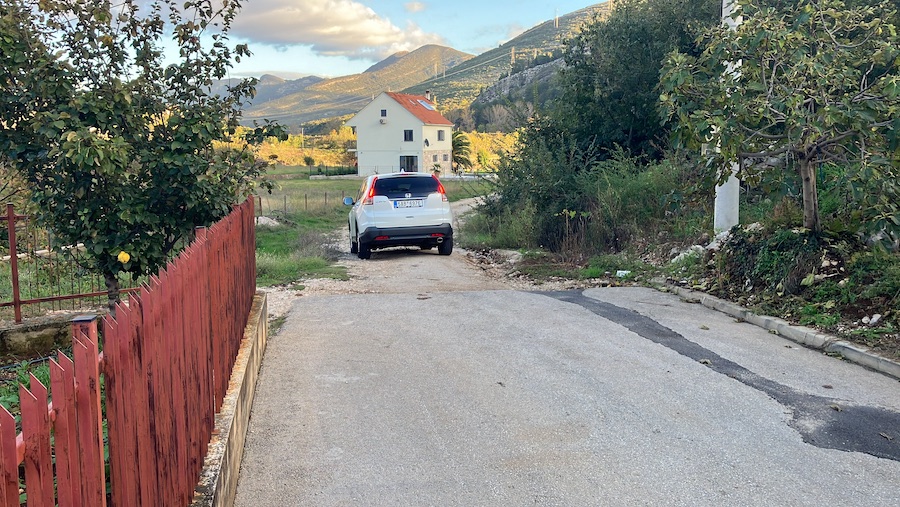
A white SUV being driven by Jan Kalavsky towards a dwelling listed as owned by his wife. Photo: ICJK
Search for the hidden sniper
As long as Kucerka and Kalavsky are protected by the asylum procedure, they cannot leave Bosnia. They can, however, move around, shop or even do business.
The weekly Plus 7 Days, which belongs to the NMH publishing house of Slovakia’s Penta financial group, interviewed Kalavsky in 2022. In it, Kalavsky complained about his situation. “It’s not easy,” he told the reporter in response to a question about how he finances his life in Bosnia. “I work part-time in a private company. I get a retirement pension of about 400 euros, it’s a pittance. I have to earn a living. Slovak journalists are already talking about me selling my cottage. Why? Well, because I have nothing to put in my mouth.”
Either his situation has improved dramatically in a year or he wasn’t telling the truth back then. The Jan Kuciak Investigative Centre, in cooperation with journalists from BIRN, managed to track down Kalavsky in the small town of Trebinje, where he has a new house with a swimming pool surrounded by a large plot of land.
Tracking him down began with a mention on the regional station Herceg TV about a Slovak named Jan Kalavsky who had opened an electric bicycle rental business in the town of Trebinje.
Trebinje is popular with tourists due to its proximity to Dubrovnik and the border with Montenegro, and it has its own tourist board. It was on the organisation’s website that we managed to find a mention of the only e-bike rental business in the town. The rental company is run by Nikdem d.o.o. and its director is Kalavsky’s wife.
We found the company that allegedly rents e-bikes located on Filipa Visnjica Street. The dead-end street is lined on both sides with houses, both new and old. After a while it turns slightly, and we cross from the asphalt to a gravel road that leads to the last house.
Halfway there, an oncoming white SUV with Prague license plates pulled up beside us, being driven by a man whom we immediately recognised from the photographs. Upon introducing ourselves as journalists from ICJK, Jan Kalavsky replied in Slovak “Jesus Mary, goodbye!”, waved his hand and accelerated away.
The house where Kalavsky lives is at the end of the street. According to the cadastre, it is owned by his wife and, with a plot of 371 square metres and a swimming pool, its value is estimated at around 200,000 euros based on other prices in the area. Together with the adjacent plots listed as agricultural land, they own more than 2,100 square metres.
We didn’t stay long and after a few minutes turned back we came. The same white SUV rolled towards us again and Jan Kalavsky braked sharply. Although we tried to communicate with him, Kalavsky wouldn’t wind down his window, but just took a picture on his cell phone and headed back towards his house.
A moment later another car pulled up alongside us, this time it was the local police. After a brief discussion, the police took our names and let us and our Bosnian journalist colleagues go.
Before we left town, we stopped at the headquarters of the local tourist organisation, Go Trebinje, to explain that we had found no sign of any e-bike rental shop at the address of Jan Kalavsky. The staff member at the centre had also never heard of such a rental shop. When we showed her that Go Trebinje was promoting it on its website, she called the listed phone number. Jan Kalavsky answered the phone and shouted at her in vulgar Serbian to send the two Bosnians and “that agent of the American embassy” away.
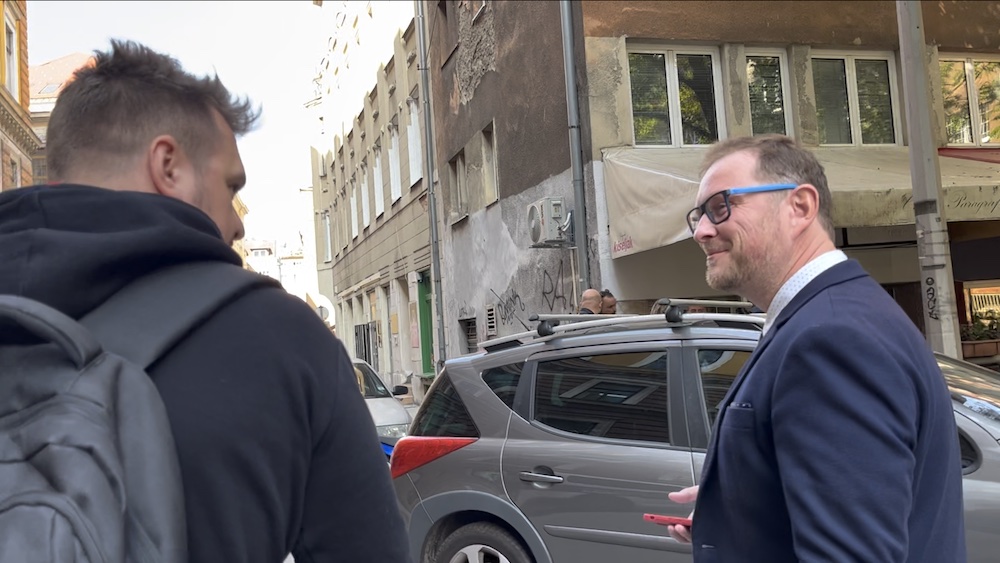
Marian Kucerka (R) in Sarajevo, Bosnia and Herzegovina. Photo: ICJK
Asylum rejected
In Sarajevo, our Bosnian colleagues managed to track down the second Slovak asylum seeker, the convicted Marian Kucerka, as he was leaving the local courthouse. He has been going there to testify via teleconference in other ongoing Slovak cases, in particular in the trial of the former special prosecutor, Dusan Kovacik.
“I don’t speak English,” is how he rebuffed enquiries from the Bosnian journalists.
Despite several weeks of communication with multiple sources and informants, his whereabouts could not be ascertained. But his lawyer Ahmed Zilic spoke to us by phone. He confirmed that Kucerka’s asylum application had been rejected by the Bosnian Ministry of Security. The lawyer promised to arrange a meeting with his client, but it never happened.
The Bosnian Ministry of Security also confirmed that, as with Kucerka, it had rejected Kalavsky’s asylum request. However, both Slovaks have appealed and their extradition to Slovakia cannot be decided until the court has ruled on that.
The Sarajevo-based lawyer Krešić points out that if the Bosnian court decides to extradite Kucerka and Kalavsky, the justice minister, Davor Bunoza, has the power to overrule such a decision. However, even this power will only be relevant if the Slovak Republic still insists on their extradition in the meantime.
Under new management
There are still international and European arrest warrants out for the already convicted Kucerka, so Slovakia is still searching for him, officially at least. However, the European and international arrest warrants for Kalavsky, who has so far been found guilty only by the first instance court, have been revoked.
“The court revoked the arrest warrants in October 2023 on the grounds that the defendant was actually residing at the given address abroad and was receiving all court mail at that address,” explains Jana Tokolyova, a spokeswoman for the Slovak General Prosecutor’s Office.
“The court proceedings took place in [Kalavsky’s] absence and ended with the pronouncement of the verdict. The first-instance proceedings have therefore already ended, the participation of him in them is not necessary and therefore the first instance court sees no need to search for him. The purpose of the arrest warrant is to ensure the participation of the person sought in the proceedings. The court of appeal will then decide for itself whether or not to issue its own arrest warrants,” she concluded.
In fact, the political situation at home has changed considerably since the Smer party of Robert Fico won the September 30 election and formed a new government with two other parties. This is Fico’s fourth government, the previous one (2016-2018) spanning the time when many of the high-level corruption cases, including those of Kucerka and Kalavsky, originate.
Both of their cases may now be affected by a proposed amendment to the Criminal Code in which the government of Prime Minister Fico wants to abolish the special prosecutor’s office.
In addition, the amendment also lowers sentencing rates. In the case of Kalavsky, which is still pending, he would now face between three and eight years instead of five to 12. Although Kucerka has already been legally convicted, if he were to return from Bosnia or be extradited, he would be able to file a motion for a retrial and challenge the fact that he was treated as a fugitive. Another novelty is that while the court would decide on this motion, Kucerka’s sentence would be suspended. Considering the sums he was found guilty of accepting in bribes (25,000 euros and 133,000 euros), he would no longer face a maximum of 10 to 15 years, but three to eight.
So, if the amendment passes, both Kucerka and Kalavsky could eventually get away with house arrest or even just probation instead of hard prison time.
Perhaps their stays in Bosnia are nearing an end after all.
Warring Factions Within the Slovak Police
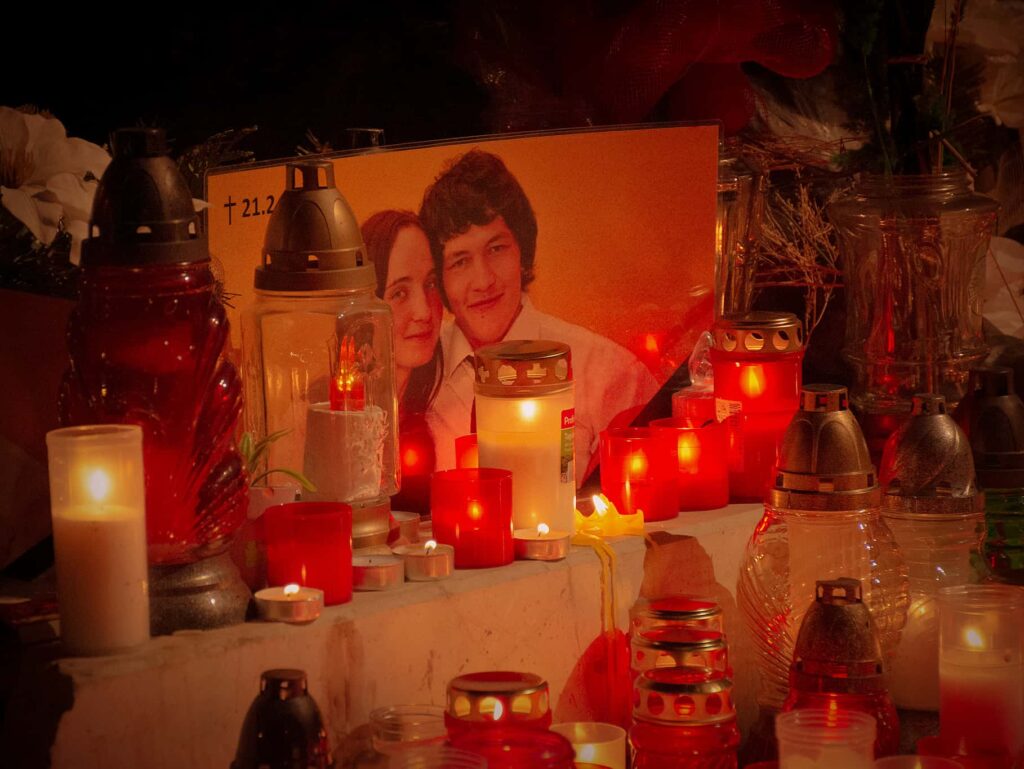
It all started with the contract killing of investigative journalist Jan Kuciak and his fiancee Martina Kusnirova in 2018, after which investigators’ hands were untied and, especially after the 2020 election that ousted Robert Fico’s Smer party, accusations and charges against people in the highest circles of the criminal, social and state hierarchy began mounting.
Yet the investigations into corruption and other crimes by influential people during the third government of Robert Fico (2016-2018) did not go unanswered. Some of the police officers at the time opposed the team formed around Jan Curilla, a well-known investigator of major cases with the elite police unit the National Crime Agency, or NAKA.
In simple terms, the two sides of the dispute could be portrayed as, on one side, the NAKA police officers, especially Jan Curilla, Pavol Durka, Stefan Masin, Milan Sabota, Robert Magula and others who are working on the Ocistec (Purgatory) case. The accused are former top officials of the Slovak police force, including the former police president and now an MP for Smer, Tibor Gaspar, and his relative, the oligarch Norbert Bodor.
On the other side stands the so-called “anti-team” of the Office of Inspection – a special unit within the Interior Ministry tasked with policing the police – led by Diana Santusova, which accused the investigators around Curilla of fabricating evidence and pressuring and manipulating witnesses.
Two Slovak police officers, Jan Kalavsky and Marian Kucerka, played a crucial role in the “war within the police”, because as a part of their defence they collected recordings of the prosecutors and NAKA investigators. These recordings were later manipulated to serve both the interests of the inspection “anti-team”, and those of Robert Fico in his attempts to discredit the investigations as they came dangerously close to his Smer party and to him personally.
Kalavsky is a former SWAT-like police tactical team member and sniper. In 2011, it was allegedly he who neutralised the serial killer and cannibal Matej Curka. Kalavsky gradually rose through the ranks to become the head of NAKA’s operational department.
Operatives are police officers who work mainly in the field, gathering information and meeting informants. One of Kalavsky’s informants was Peter Petrov, who was close to the “Takacovci” organised crime group. As chief of operatives, Kalavsky had ready access to information about what actions were being planned and, according to Petrov’s testimony, he supposedly sold such information to Petrov in return for bribes. In June 2023, the Specialised Criminal Court sentenced Kalavsky to seven years in prison and a fine of 5,000 euros for leaking information. One of those he supposedly tipped off in advance that his colleagues were gunning for him was Kucerka.
Kucerka was head of the financial police of the Bratislava department of NAKA. He held this important post from 2017 to 2020, when his colleagues arrested him as part of an investigation codenamed “Judas”. Thanks to the warning from Kalavsky, however, he had reportedly prepared for the search. He had a new mobile phone, the old one, according to his own testimony, he broke and threw into a lake. According to the investigation, Kucerka took a bribe of 20,000 euros for not investigating Stefan Ziga, a relative of the former minister and now MP for the Hlas party, Peter Ziga. The bribe was supposed to have been brokered by the Nitra oligarch Norbert Bodor.
Kucerka first decided to confess. Then he retracted his confession and accused prosecutors of pressuring him. He later apologised to prosecutors and nearly struck a plea bargain. He expected to receive only probation, but the prosecutor proposed a prison sentence of six years and eight months. In court, Kucerka again maintained his innocence, but was found guilty first by the Specialised Criminal Court and then in July 2023 by the State Court. He was sentenced to 10 and a half years imprisonment and forfeiture of property.
Neither he nor his colleague Kalavsky ended up in a Slovak prison cell, but both fled to Bosnia and Herzegovina. As a parting shot, they put in the hands of the police inspection’s “anti-team” the manipulated materials that are still being used in criminal proceedings against their former colleagues around Curilla.
Tomáš Madleňák is a Slovak journalist who has worked for the Investigative Center of Ján Kuciak since 2020. He is based in Bratislava.

